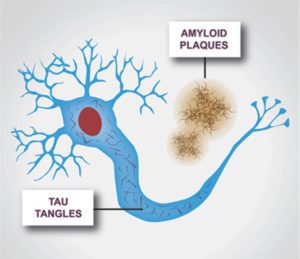By Nasser Razack, MD, JD


Inflammation is our immune system’s response when the body is attacked by foreign substances. It allows the body to defend itself by producing a hostile environment to kill unwanted intruders. Inflammation is great when our body is under attack; however, inflammation can also be triggered to attack normal healthy tissue. In this scenario, inflammation produces a hostile environment within the body that damages healthy tissue instead of destroying unwanted invaders.
For decades, inflammatory changes have been recognized to occur within the brain of patients with Parkinson’s disease. However, it was only recently that inflammation has been identified as a cause, and not merely a result, of this progressive disease.
Inflammation within the brain has unique inflammatory markers specific to their corresponding inflammatory disease. For example, inflammation of blood vessels within the brain results in arterial plaque that reduces blood flow. Inflammation in the brain of Alzheimer’s disease patients results in the production of amyloid plaques and neurofibrillary or tau tangles. On the other hand, inflammation in the brain of Parkinson’s disease patients results in the production of Lewy bodies.
It is not imperative to recall the names of these different inflammatory-related structures. Instead, it is more important to realize that all of these structures—arterial plaque, Alzheimer’s disease-related plaques and tangles, and Parkinson’s disease-related Lewy bodies—have long existed within the brain of patients with these progressive disorders. In fact, there is evidence that inflammatory markers begin to accumulate in people as young as 20 years old. As these markers proliferate, they trigger more inflammation which results in the formation of more of these inflammatory markers. This positive feedback cycle results in the progression and severity of the specific disease.
Numerous studies have been conducted to address factors that may contribute to the development of these progressive diseases. An article published in the Annals of Clinical and Translational Neurology on May 31, 2018, demonstrated certain types of immunosuppressant drugs administered to patients resulted in a lower risk of developing Parkinson’s disease. Additionally, the long-term use of ibuprofen (also an anti-inflammatory drug) for pain relief was associated with a lower risk of Alzheimer’s disease, according to a study published in the May 6, 2008 issue of Neurology®. This study demonstrated people who used ibuprofen for over five years were more than 40 percent less likely to develop Alzheimer’s disease. The results also demonstrated that the longer ibuprofen was used, the lower the risk for dementia.
Now you’re probably thinking that all you have to do is take these drugs to reduce your chances of developing Alzheimer’s or Parkinson’s disease, right? Well not exactly. Although studies demonstrate the reduction of both Alzheimer’s and Parkinson’s disease with these drugs, both drugs have significant side effects. In fact, nonsteroidal anti-inflammatory drugs (NSAIDs) have been associated with the increased risk of heart attack and stroke, not to mention liver, kidney and G.I. problems.
But what if we could reduce inflammation in the body without significant risk? Are there substances existing in nature that can naturally accomplish this without the negative side effects?
The answer is YES! In fact, recent research demonstrates that the dietary intake of polyphenols or phenolic compounds may exert neuroprotective properties that target multiple negative processes which result in cognitive disorders such as Alzheimer’s and Parkinson’s disease. While the investigation of the effects of these substances is still early, two things are certain. First, these compounds are well tolerated with little if any side effects and second, they are extremely potent anti-inflammatory agents. Additionally, polyphenols are now known to undergo metabolism and transformation by the gut microbiome into other bioactive molecules whose effects on the brain may be considerable.
Stroke, Alzheimer’s and Parkinson’s disease are inflammatory-based disease processes with specific inflammatory markers. These inflammatory markers and conditions in the brain and other parts of the body result in a positive feedback cycle, culminating in end-stage disease whether it be Parkinson’s, Alzheimer’s or stroke. Theoretically, blocking brain inflammation and other degenerative processes can delay the onset of inflammatory-based neurodegenerative diseases such as Parkinson’s and Alzheimer’s. For example, twin-based studies have demonstrated the use of ibuprofen can delay the onset of Alzheimer’s disease and thus its incidence.
Recently, however, animal models have established that polyphenol compounds such as curcumin are more effective than ibuprofen and other nonsteroidal anti-inflammatory drugs in blocking inflammation with nearly no side effects. Neurcumin® is an all-natural supplement which, in addition to curcumin, contains many other polyphenols and other natural agents uniquely formulated to synergistically fight inflammation. To learn more about Neurcumin® and the prevention of inflammatory diseases such as Parkinson’s, Alzheimer’s, stroke and heart attack, please visit Neurcumin.com. You may also call 727-289-7139 or email us at strokenerd@gmail.com for more information.
About Nasser Razack, MD, JD
Dr. Razack currently practices as a neurointerventional surgeon in Naples, Florida. He dedicates a significant portion of his practice to educating in the diagnosis, treatment and prevention of stroke. He completed his medical training at the University of Virginia in Charlottesville, Virginia.
 Southwest Florida's Health and Wellness Magazine Health and Wellness Articles
Southwest Florida's Health and Wellness Magazine Health and Wellness Articles
